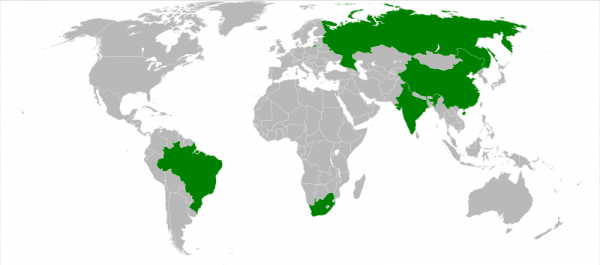
After World War II, the theory that economic integration would reduce the possibility of open conflict between two nation states was tried and was deemed successful by history when France and West Germany signed the first accords that would grow to become the European Union. When Russia recently annexed Crimea, the first response by Western powers was to alienate Russia economically. The difference between putting sanctions on a country like Syria or Iran is that their political, economic and military weight outside of their region is negligible to the West. With Russia, any conflict becomes a global one, and invariably effects international commerce worldwide.
While trade between Russia and many countries in the Western world are limited, the political weight of Russia drags with it several diverse interest groups, especially those trade giants in the BRICS. While the BRICS have little in common besides large economies with large populations that grew rapidly for a period of time, they do represent a new economic block that has a great effect on the world economy and even Western nations themselves. There are no direct links between Russia’s world view of Crimea and the West that ties in neatly with the other BRICS nations, but most of them seem to have historical disagreements that would push them on the side of Russia over those interests expressed by the U.S. or EU.
Brazil is the informal economic representative of Latin America. As a representative of the region, it sees the United States as self interested in a detrimental way. Brazil wishes to stand against this historical divide that has formed much of Latin America’s history over the last century, and this might be part of the rationale for its support for Russia. India was formed in turmoil after hundreds of years as a colonial subject of Great Britain. While maintaining in close relations with the U.K. and U.S., India seeks its own interests as a post-colonial power and often stands against larger powers worldwide. India is also very aware of its proximity and ties to Russia which has benefitted it in the past in a rough neighborhood. China is the subject of many policy briefs on whether or not they should shift their support to Russia or the Ukraine, but as the alternative for oil, manufacturing and weapons for states that have burned their bridges with the West, China can sustain many nations with their own trade relations or make Western economies uncomfortable with a change in policy. Along with South Africa, the BRICS nations stood by Russia in recent talks on the issues surrounding Crimea, showing that while the West can shake Russia’s economy at will, the BRICS enjoy their position of power despite their diverse interests and would push back against such moves against a similar economy.
Conflict is certainly not good for business, but the BRICS often need support of the West as it is still the largest base for its consumers and many BRICS countries have grown because of their economic ties to the U.S. and EU. A few years ago when Brazil and Turkey sought to involve themselves with the U.S.-Iranian relations they created a rift between themselves and the United States. Brazil since that time had pulled back from getting involved with the mess in the Middle East and re-oriented itself to become a source of power, but a balanced one in order to maintain good relations with the U.S. and leftists in Latin America. Brazil recently took quiet steps to reign in President Maduro’s actions against protesters in Venezuela while trying to keep ties open between the two left wing governments.
While BRICS nations are not responsive to the U.S. as a hegemon in their respective regions, they also wish to maintain a good business relationship. It is clear that BRICS nations have to deal with concerns of the U.S. and EU, but are not shy in venting their concerns alongside their BRICS partners in a show of strength, even if they consist of very divergent interests. Beyond relations with Russia, it is not likely that trade and investment would be hindered with the remaining countries as it would damage both the West and these emerging economies for the sake of Russian foreign policy. President Putin is likely aware of the effect his actions will take on his adversaries and allies. With a weak coalition of support coming from the BRICS it is likely that the Middle East and its mess will be the point of contention between the West and Russia, if the new Cold War continues into the near future.